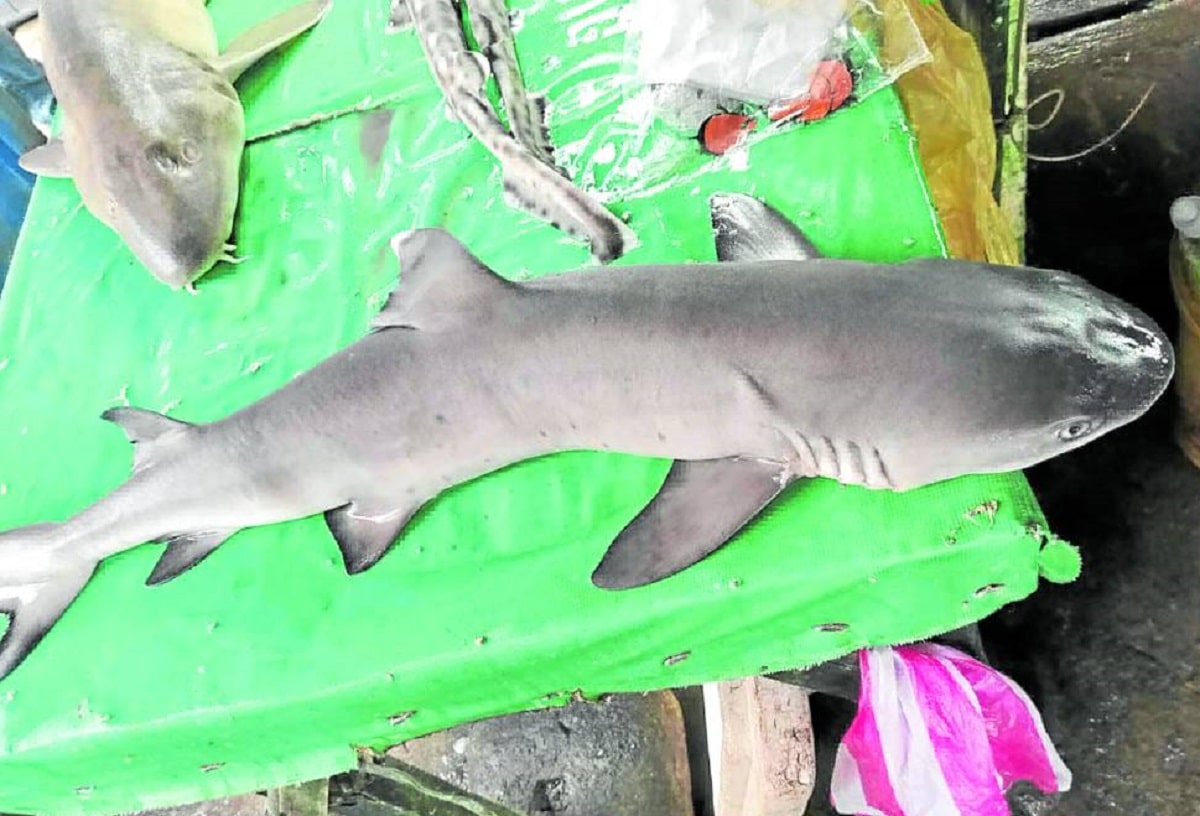
MARKET FIND A market monitoring and validation conducted by a team from BFAR and the provincial law enforcement coordinating committee on Aug. 19 confirms that these coral catsharks and whitetip reef sharks are sold with other seafood at the public market of Matnog, Sorsogon. —Photo courtesy of BFAR
LEGAZPI CITY, ALBAY, Philippines — The Bureau of Fisheries and Aquatic Resources (BFAR) has started its inspection of the public market in Matnog town in Sorsogon after photos of sharks and rays being sold there for their meat went viral on social media last week.
In a statement on Tuesday, BFAR reminded the public that whitetip reef sharks and several other species of sharks are protected under an international convention and Philippine laws.
Several photos posted on social media by local news outlet Sorsogon News showed that five coral catsharks (Atelomycterus marmoratus) and two whitetip reef sharks (Triaenodon obesus) were being sold in the public market alongside sea rays.
READ: House OKs bills deregulating bamboo; regulating sale of sharks, rays, chimeras
The post has garnered over 11,000 reactions, 1,086 comments and over 3,800 shares on Facebook as of Wednesday.
The viral post prompted validation and coordination with the local government of Matnog and an information campaign on the Convention on International Trade in Endangered Species of Wild Fauna and Flora (Cites).
“The coral catshark is not listed under the Cites but its capture and trade are covered by other applicable regulations,” according to the BFAR.
Meanwhile, the catching, possession, transport, sale and trade of whitetip reef sharks are prohibited under Appendix II of Cites and violations may incur P300,000 to P3 million in penalties, according to the agency.
Legislation
BFAR further reminded the public that several other shark species are protected under Cites “to [prevent] overexploitation and [ensure] the sustainability of marine ecosystems.”
Republic Act No. 10654, or the amendments to the Philippine Fisheries Code of 1998, also protects sharks and manta rays against illegal, unreported and unregulated fishing of endangered, threatened or vulnerable species.
“This legislation underscores the government’s commitment to preserving marine biodiversity, especially species that play vital roles in maintaining ecological balance,” the BFAR said.
Ubaldo Ubaldo, the municipal administrator of Matnog, told the Inquirer in a telephone interview on Wednesday that they were awaiting the BFAR’s report with the recommendations after the completion of the inspection.
“The local government is strict about illegal fishing, and our mayor (Cattleya So) has issued a clear order to do everything to stop this alleged selling of sharks,” Ubaldo said.
Emmanuel de Guzman, the municipal agriculturist of Matnog, said they would follow any recommendations from the BFAR.
De Guzman said they would intensify market inspection and post information, education and communication materials at the market and in the coastal areas.
Ubaldo said that in Matnog, sharks become bycatch in longline fishing or longlining. Longline fishing is a commercial fishing technique that uses a long main line with baited hooks attached at intervals via short branch lines called “snoods” or gangions.
“Sometimes a shark gets caught. This is not something the fisherfolk do for a living and it is not rampant,” Ubaldo told the Inquirer.
A fisher, he said, usually does not know that the shark caught in the line is endangered.
“Maybe there is a need for massive information dissemination to the public so they can become familiar with the prohibited species,” Ubaldo said.